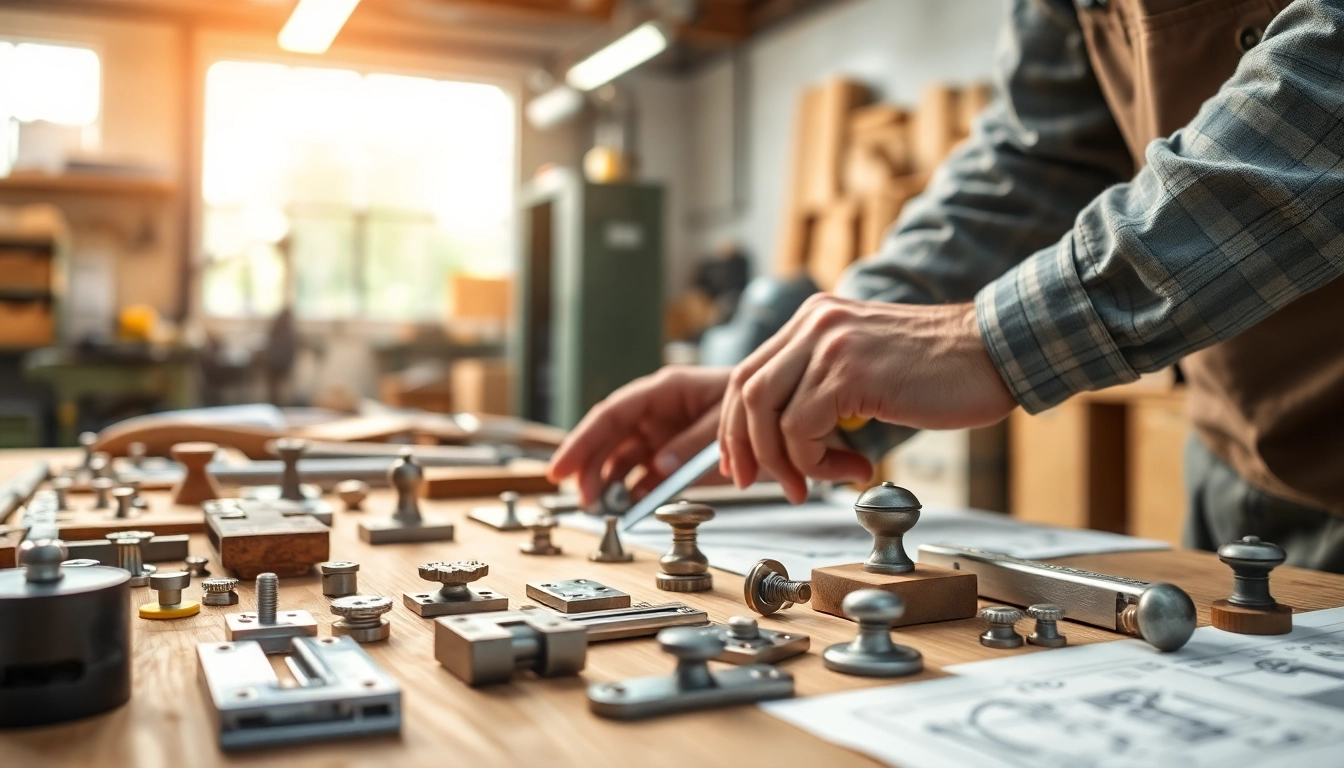
Understanding Furniture Hardware Manufacturers
Furniture hardware manufacturers play a crucial role in the furniture industry, providing essential components that enhance both functionality and aesthetic value. From drawer slides to cabinet hinges, these manufacturers produce a wide range of products that are integral to the user experience in residential and commercial spaces. With the evolution of design trends and consumer preferences, furniture hardware manufacturers are constantly adapting to meet the diverse needs of the market.
What are Furniture Hardware Manufacturers?
Furniture hardware manufacturers are specialized firms that design, produce, and supply hardware components used in furniture construction and assembly. Their product lines typically include but are not limited to drawer slides, hinges, knobs, pulls, locks, and other accessories that are crucial for the functionality of furniture items. The manufacturing process often involves precision engineering and a deep understanding of material properties to create durable and reliable products.
Key Products and Services Offered
The range of products offered by furniture hardware manufacturers is extensive. Here are some of the most critical categories:
- Drawer Slides: Essential for smooth operation in cabinets and drawers. They can be full-extension, soft-close, or even push-to-open types.
- Hinges: Used for doors and lids, they come in various styles, including concealed and decorative hinges, allowing for both functional and aesthetic integrations.
- Handles and Knobs: Available in diverse styles and materials, they serve both practical and decorative purposes in cabinetry.
- Locks: Critical for security in furniture, particularly in office and commercial environments.
- Legs and Supports: These elements are vital for stability and can enhance the furniture’s design through various materials and styles.
Importance of Quality in Hardware Manufacturing
Quality is a cornerstone of functionality and durability in furniture hardware. High-quality hardware can significantly enhance the overall longevity of furniture, leading to greater customer satisfaction and reduced warranty claims. Key aspects of quality include:
- Material Selection: The choice of raw materials can affect durability, appearance, and performance under stress.
- Manufacturing Processes: Advanced techniques such as CNC machining, laser cutting, and finishing can produce highly precise components.
- Testing and Compliance: Quality assurance processes ensure that products meet industry standards for safety and performance.
Market Overview of Furniture Hardware Manufacturers
The market for furniture hardware manufacturers is dynamic and evolves based on technological advancements, consumer preferences, and economic factors. Understanding the current landscape is essential for stakeholders looking to enter or expand in this market.
Current Trends in the Industry
Several key trends are shaping the furniture hardware industry today:
- Customization: Increasing demand for personalized solutions has prompted manufacturers to offer customizable hardware options, allowing customers to select styles that align with their unique design preferences.
- Sustainability: Eco-friendly materials and manufacturing processes are gaining popularity as consumers become more environmentally conscious.
- Smart Technology: The rise of smart home technology is impacting hardware designs. Manufacturers are integrating technology into traditional hardware solutions, such as electronic locks and automated drawer systems.
Key Players in the Market
The furniture hardware industry is populated by numerous players, ranging from large global manufacturers to niche innovators. Key players include:
- Top Knobs: Renowned for a diverse selection of premium-quality cabinet, drawer hardware, and bath accessories.
- Rockler: Offers a well-rounded selection of hardware solutions for furniture projects, particularly focusing on DIY markets.
- Furnica: A significant player in the USA with a comprehensive range of hardware products, particularly noted for customization options.
- Richelieu: Specialty provider of innovative solutions in the decorative hardware segment.
Analysis of Competitive Strategies
Successful manufacturers employ various strategies to maintain competitive advantage:
- Product Innovation: Continuous product development to meet changing consumer demands is vital. This includes adopting new materials and manufacturing technologies.
- Brand Positioning: Establishing a strong brand identity that conveys quality, reliability, and design sophistication can differentiate manufacturers in a crowded market.
- Customer Engagement: Engaging with both B2B and B2C segments through targeted marketing and customer support enhances loyalty and repeat business.
Selecting the Right Hardware for Your Projects
Choosing the right furniture hardware is essential for both functionality and aesthetics. Here are some crucial considerations to keep in mind:
Considerations for Quality and Durability
When selecting hardware, it is important to prioritize quality and durability. Look for products that have:
- Material Quality: Stainless steel or brass are preferable to plastics for strength and longevity.
- Finish Durability: Choose hardware with finishes that are resistant to tarnishing, rust, and wear.
Custom Solutions vs. Standard Products
Depending on the project’s needs, you may decide between custom solutions or standard products:
- Custom Solutions: Offer unique designs that can result in a tailored aesthetic. They may come at a higher cost and longer lead time.
- Standard Products: These are cost-effective and available immediately, suitable for general applications.
How to Match Hardware with Furniture Styles
Matching hardware with the overall furniture style enhances the desired aesthetic. Consider:
- Modern Furniture: Sleek, minimalist hardware often complements contemporary designs.
- Rustic Styles: Textured or matte finishes may work better in farmhouse or vintage-inspired pieces.
- Transitional Designs: A mix of classic and modern hardware can flatter transitional furniture styles.
Buying Furniture Hardware: Navigating Your Options
When it comes to purchasing furniture hardware, understanding your options can significantly impact your choices. Here’s what to consider:
Where to Buy Quality Hardware
Quality hardware is available through various channels:
- Online Retailers: Websites such as Amazon, specialized hardware stores, and manufacturer sites offer robust selections.
- Local Hardware Stores: Visiting local stores allows for hands-on experience with products before purchase.
- Wholesale Suppliers: For bulk purchasing, wholesalers can provide significant discounts and variety.
Online vs. Local Vendors: Pros and Cons
Each purchasing channel has its advantages and challenges:
- Online Vendors: Pros include convenience and a wider selection; cons can be delayed shipping and inability to assess product quality physically.
- Local Vendors: Pros include immediate availability and the opportunity for in-person advice; cons may include limited stock and higher prices.
Understanding Pricing Structures
Pricing for furniture hardware can vary widely based on factors like material, brand, and complexity of the product. It’s wise to:
- Compare Prices: Use online resources to compare prices among different retailers.
- Factor in Quality: Sometimes, a higher upfront cost leads to savings in durability and function over time.
Future of Furniture Hardware Manufacturing
The furniture hardware industry is undergoing significant changes, driven by technology, consumer demand, and sustainability initiatives. Looking ahead, here are some trends and projections:
Innovations on the Horizon
The following innovations are expected to shape the future of the industry:
- Smart Hardware Solutions: Integration of smart technologies in furniture hardware will enhance functionality and user experience.
- 3D Printing: This technology can revolutionize manufacturing processes by enabling rapid prototyping and customization.
Impact of Sustainability Practices
Sustainability is becoming a core value for both manufacturers and consumers. Key impacts include:
- Material Sourcing: A shift towards sustainable materials, such as recycled metals and eco-friendly finishes.
- Manufacturing Processes: More companies are adopting practices that minimize waste and energy consumption.
The Role of Technology in Manufacturing
Technology is playing an increasingly critical role in how furniture hardware is manufactured:
- Automation: Automated production lines can improve efficiency and reduce labor costs.
- Data Analytics: Manufacturers leverage data to streamline operations and enhance product development.







